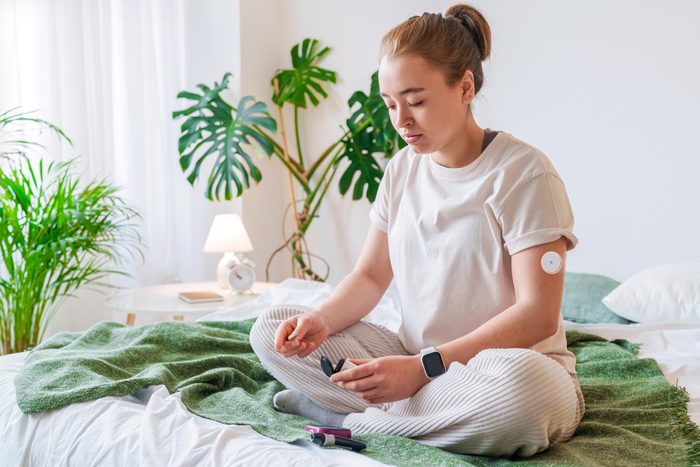Here’s How Naps Affect Your Blood Sugar
Updated: Nov. 27, 2023

Here's what to know about how naps can affect your blood sugar—whether you have diabetes or not.
For the most part, your blood sugar going up or down depends on two things, says Kevin Peterson, MD, vice president of primary care for the American Diabetes Association and a professor at University of Minnesota Medical School. It depends on your diet, he explains, and your resting blood sugar, which is your level when you wake up or haven’t eaten.
What if you need a quick, refreshing midday snooze, though? Can taking a nap affect your blood sugar levels? Dr. Peterson says keeping when you last ate and your resting blood sugar in mind when you plan the timing of your naps is key.
Get The Healthy @Reader’s Digest newsletter
Does taking a nap raise your blood sugar?
“The nap itself doesn’t change the blood sugar very much. If you haven’t eaten, and your blood sugar is at a resting level, it will stay the same. If you take a nap after you eat, it will probably go up,” Dr. Peterson explains.
Sanjay R. Patel, MD, a professor of medicine and epidemiology at the University of Pittsburgh and the medical director of the University of Pittburgh Medical Center’s Comprehensive Sleep Disorders program, says it’s hard to make generalizations about whether naps are good or bad for blood sugar because everything depends on an individual’s overall health—if they’re getting enough sleep at night, if they are generally healthy without diabetes or if they have diabetes, he says.
Fasting at This Time of Day Can Help Control Blood Sugar, Says New Study
Is it bad for me to nap if I have diabetes?
A nap in the afternoon can be perfectly fine if you have diabetes, Dr. Peterson says, as long as you maintain a healthy lifestyle that includes physical activity and healthy eating.
One 2016 study published in the Iranian Journal of Medical Sciences actually found that a short daytime nap can help improve blood sugar control for people with diabetes who didn’t get a great night of sleep the night before.
9 Secret Effects Your Blood Sugar Has on Your Health, Say Doctors
“Sometimes people [with diabetes] worry about what might happen if their blood sugar gets low during a nap, but a low blood sugar will usually wake you up,” Dr. Peterson explains.
“If you are having lots of lows, however, then you should see your doctor. If your blood sugar is well controlled, then finding a good time to nap is mostly a personal preference,” he adds.
The Healthy @Reader’s Digest’s Medical Review Board Co-Chair Latoya Julce RN, BSN adds, “If a person has diabetes, I would recommend checking sugar levels before and after nap, in order to avoid sugar lows and highs.”
Here’s Why You’re Hungry After a Nap, Says a Nutrition Expert
Should I nap if I don’t have diabetes?
What about naps if you don’t have diabetes…is that OK?
2016 research published in Scientific Reports found naps under 60 minutes were not linked to diabetes, while a 2016 study published in peer-reviewed journal SLEEP found that naps over 40 minutes were linked to increased risk for metabolic disease. So if you’re dozing off, a 30-minute timer could be the solution.
You may also want to be careful with how often you take a siesta. A 2017 analysis of seven studies which examined the relationship between napping and Type 2 Diabetes found that in general, people who took habitual daytime naps had a 17% higher chance of developing diabetes compared to those who didn’t nap during the day. A 2023 study published in Nutrition & Metabolism also linked regular daytime napping with a risk for diabetes in most adults.
So if you want to avoid doing damage to your blood sugar levels, research suggests keeping your naps short, sweet and infrequent.
For more wellness updates, subscribe to The Healthy @Reader’s Digest newsletter and follow The Healthy on Facebook and Instagram.


















